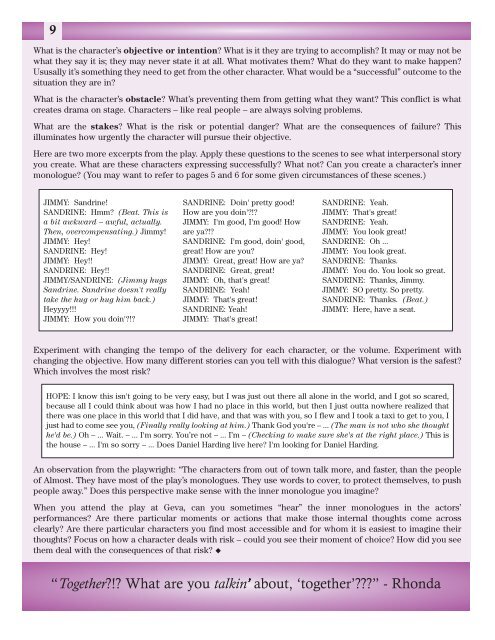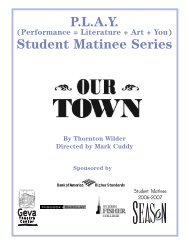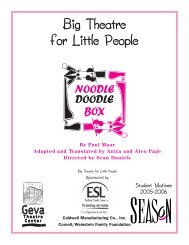P.L.A.Y. ALMOST, MAINE - Geva Theatre
P.L.A.Y. ALMOST, MAINE - Geva Theatre
P.L.A.Y. ALMOST, MAINE - Geva Theatre
You also want an ePaper? Increase the reach of your titles
YUMPU automatically turns print PDFs into web optimized ePapers that Google loves.
9<br />
What is the character’s objective or intention? What is it they are trying to accomplish? It may or may not be<br />
what they say it is; they may never state it at all. What motivates them? What do they want to make happen?<br />
Ususally it’s something they need to get from the other character. What would be a “successful” outcome to the<br />
situation they are in?<br />
What is the character’s obstacle? What’s preventing them from getting what they want? This conflict is what<br />
creates drama on stage. Characters – like real people – are always solving problems.<br />
What are the stakes? What is the risk or potential danger? What are the consequences of failure? This<br />
illuminates how urgently the character will pursue their objective.<br />
Here are two more excerpts from the play. Apply these questions to the scenes to see what interpersonal story<br />
you create. What are these characters expressing successfully? What not? Can you create a character’s inner<br />
monologue? (You may want to refer to pages 5 and 6 for some given circumstances of these scenes.)<br />
JIMMY: Sandrine!<br />
SANDRINE: Hmm? (Beat. This is<br />
a bit awkward – awful, actually.<br />
Then, overcompensating.) Jimmy!<br />
JIMMY: Hey!<br />
SANDRINE: Hey!<br />
JIMMY: Hey!!<br />
SANDRINE: Hey!!<br />
JIMMY/SANDRINE: (Jimmy hugs<br />
Sandrine. Sandrine doesn't really<br />
take the hug or hug him back.)<br />
Heyyyy!!!<br />
JIMMY: How you doin'?!?<br />
SANDRINE: Doin' pretty good!<br />
How are you doin'?!?<br />
JIMMY: I'm good, I'm good! How<br />
are ya?!?<br />
SANDRINE: I'm good, doin' good,<br />
great! How are you?<br />
JIMMY: Great, great! How are ya?<br />
SANDRINE: Great, great!<br />
JIMMY: Oh, that's great!<br />
SANDRINE: Yeah!<br />
JIMMY: That's great!<br />
SANDRINE: Yeah!<br />
JIMMY: That's great!<br />
SANDRINE: Yeah.<br />
JIMMY: That's great!<br />
SANDRINE: Yeah.<br />
JIMMY: You look great!<br />
SANDRINE: Oh ...<br />
JIMMY: You look great.<br />
SANDRINE: Thanks.<br />
JIMMY: You do. You look so great.<br />
SANDRINE: Thanks, Jimmy.<br />
JIMMY: SO pretty. So pretty.<br />
SANDRINE: Thanks. (Beat.)<br />
JIMMY: Here, have a seat.<br />
Experiment with changing the tempo of the delivery for each character, or the volume. Experiment with<br />
changing the objective. How many different stories can you tell with this dialogue? What version is the safest?<br />
Which involves the most risk?<br />
HOPE: I know this isn't going to be very easy, but I was just out there all alone in the world, and I got so scared,<br />
because all I could think about was how I had no place in this world, but then I just outta nowhere realized that<br />
there was one place in this world that I did have, and that was with you, so I flew and I took a taxi to get to you, I<br />
just had to come see you, (Finally really looking at him.) Thank God you're – ... (The man is not who she thought<br />
he'd be.) Oh – ... Wait. – ... I'm sorry. You’re not – ... I’m – (Checking to make sure she's at the right place.) This is<br />
the house – ... I'm so sorry – ... Does Daniel Harding live here? I'm looking for Daniel Harding.<br />
An observation from the playwright: “The characters from out of town talk more, and faster, than the people<br />
of Almost. They have most of the play’s monologues. They use words to cover, to protect themselves, to push<br />
people away.” Does this perspective make sense with the inner monologue you imagine?<br />
When you attend the play at <strong>Geva</strong>, can you sometimes “hear” the inner monologues in the actors’<br />
performances? Are there particular moments or actions that make those internal thoughts come across<br />
clearly? Are there particular characters you find most accessible and for whom it is easiest to imagine their<br />
thoughts? Focus on how a character deals with risk – could you see their moment of choice? How did you see<br />
them deal with the consequences of that risk? <br />
“Together?!? What are you talkin’ about, ‘together’???” - Rhonda





